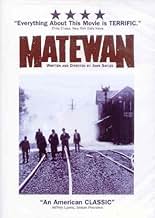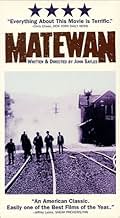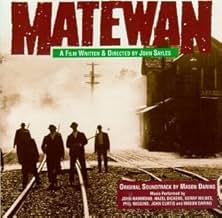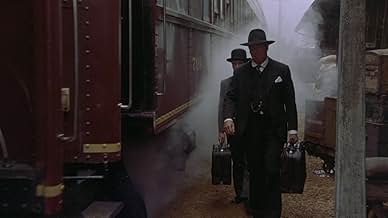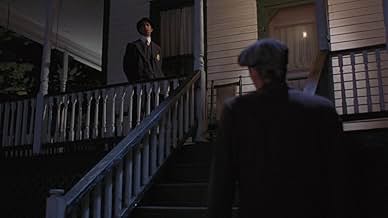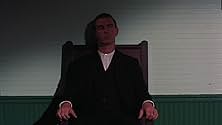अपनी भाषा में प्लॉट जोड़ेंA labor union organizer comes to an embattled mining community in 1920 West Virginia, brutally and violently dominated and harassed by the mining company.A labor union organizer comes to an embattled mining community in 1920 West Virginia, brutally and violently dominated and harassed by the mining company.A labor union organizer comes to an embattled mining community in 1920 West Virginia, brutally and violently dominated and harassed by the mining company.
- 1 ऑस्कर के लिए नामांकित
- 3 जीत और कुल 8 नामांकन
- Ellix
- (as Michael Preston)
फ़ीचर्ड समीक्षाएं
The conditions these workers faced were brutal. Miners had to pay for all their own equipment, their housing was owned by the mining company and they also paid for it, workers were also paid in credits which they could only use at the mining company store. Workers who went strike were subsequently evicted from their homes.
This movie is great. It's a page from history which should be told much more often. James Earl Jones is terrific as a black miner who is signed up as a scab but he's actually a union sympathizer who encourages the black scabs to strike with the West Virginia workers.
Chris Cooper is also great as a union organizer. I think he's a highly underrated actor. He was very good in American Beauty as the hick next door neighbor and he's great in Matewan as well. Proof, I believe that he can really take on any role.
Bob Gunton is also a great actor. This movie was made long before he was playing every two bit villain of the week. I think that was due to his role as the warden in The Shawshank Redemption where he just let it all out.
I liked one scene in particular early in the film where the union men on strike try to weed out Cooper by finding out how much he knows about union history. Where was Joe Hill buried? In which eye was Big Bill Haywood blind in? Cooper also quips, "I was a Wobbly, back when that meant something" But he does support the notion of One Big Union. The IWW will rise again!
What a lovely world he creates here, among the derelict shacks and cabins of the Pennsylvania foothills of Matewan a moral struggle is fought, flawed characters with faces blackened by coaldust fumble with great ideals and big hopes for a better future, and the one thing that stands between them and justice is their own prejudice. I like how the film suggests that for the collective to be reformed the individual must be reformed first, that we need to look inwards first before we make a stand. The stand in the film is heroic but also desperate, a bit of a lawless old West on the way to emancipation. John Sayles is a leftist and this comes across loud and clear in Matewan, but unlike a Godard film like Week End, Sayles doesn't call for blood, he calls for social justice.
The narrative here sprawls in and out of log cabins where sullen faces plot strikes and discuss ideals, in and out of makeshift tents and muddy town streets where coalminers live and die and sing, now a fiddle or harmonica is calling out from the dark the sad tune of a life of suffering, and the finale is sealed with a shootout filled with tragedy and hope. Sayles' camera doesn't intrude in any of this, rather it's invited in and hankers down out of way to quietly listen or conspire.
Matewan makes a great doublebill with Martin Ritt's The Molly Maguires, another forlorn drama of the oppressed that speaks of moral devastation in the Pennsylvania coal fields, but more, it stands by itself as one of the great American narratives of the 80's.
See Matewan for its wonderful portrayal of the events that occurred in West Virginia in the 1920's. See this film for its phenomenal cast. See it for its beautiful cinematography. There is an ethereal glow that envelopes the characters and buildings of Matewan.
There is also an underlying allegorical depiction of Christ and his followers. Chris Cooper is a saint. He reminds me of Gary Cooper a little bit. He has such an unusual handsome face. He is the protagonist joined by James Earl Jones, Mary Mcdonnell, and Will Oldman. Perhaps the most fascinating character is that of the Sheriff portrayed by Strathairn. He is the angel on the black horse who carries with him the wrath of God. Just watch him stand up against the bad guys.
The main antagonistic characters are pure evil. They terrorize the inhabitants of Matewan with juvenile antics.
Please see this film and be prepared to have it imbedded in your mind for the rest of your life. This is what great film making is about
One needs to search intensely to finally reveal the true history of our period of industrialization. It is of great credit to the producer's and director's of such films as "Matewan" that we can see clearly the history and ongoing great struggle between the working class and the wealthy elite to obtain their proper share of "profits."
This is a film where one enters a theater to be "entertained", but leaves having the stirrings of compassion and outrage raised in their hearts. It reminds us that there is a human price paid for economic gain.
John Sayles is a truly admirable film-maker. For three decades now he has been making intelligent and eminently watchable movies, turning down Hollywood's money in order to preserve his artistic independence. He often takes a small acting role in his films - and acquits himself more than competently. In "Leanna" he played the predatory college lecturer, and here he is the 'hardshell' baptist preacher. He gives quite a performance.
West Virginia's misty greenness and steep, wooded slopes are evoked beautifully. The shabby rail depot where the shoot-out takes place is a genuine West Virginian location. The feel for both period and place is created with loving sensitivity. Director of Photography Haskell Wexler has done a great job (look out for the terrific train shot). There is a persuasive grittiness and realism about all of the images, and especially the climactic gun battle, that is utterly absorbing. The music which accompanies the action contains authentic vernacular songs, in perfect keeping with what is in essence a true story.
In the first years of the twentieth century, mine workers in West Virginia lived in abject poverty. Subjected to the 'truck' system, they were paid, not in cash, but in company credits. They had no choice but to spend their wages at the company store, where the mine owners dictated the prices. On top of this, each worker was obliged to buy his own tools and to pay for wash-house facilities.
Into the community of Matewan comes a saintly stranger, Joe Kenehan (played by Chris Cooper). Kenehan is a deserter from Levenworth, a conscientious objector who has taken to the creed of socialism with almost religious fervour. Sent by the union as an emissary, Kenehan's task is to win the confidence of the people and to educate them in the ways of organised labour.
If Kenehan is a symbol of enlightened socialism, 'Few Clothes' Johnson (James Earl Jones) represents the true working-class hero. Few Clothes understands mining more deeply than his bosses ever will. Though he is now in his 50's, his fine body remains immensely strong. This good and gentle man does not like violence, but he will fight to protect his people against their natural enemies - the agents of the mine owners.
Sayles' first-class screenplay cleverly exploits the religious imagery which suffuses the language of these simple, God-fearing folk. The film makes the point that the 'getting' of socialism is a form of religious conversion. Kenehan is a wandering missionary, rather like a biblical prophet, preaching the salvation of collective bargaining. He is an alternative to the preachers, bringing Revelation to the miners, "puttin' the spirit into 'em". Little wonder that Bridey Mae Tolliver (Nancy Mette), the would-be seductress, is seen by the locals in terms of the Old Testament story of Joseph and Potiphar.
The tale is narrated by Davey, the boy preacher whose sheer humanity draws him into the workers' fold. In this wilderness west of the Shenandoah Valley, two broad movements have developed within the baptist faith - hardshell and softshell. The hardshell preachers dispense a strict, unyielding brand of christianity which is unsympathetic to the miners' cause - after all, there is the parable of the toilers in the vineyard. Davey is a softshell preacher, a believer in the brotherhood of man who interprets Christ's message as an exhortation to kindness.
And then there are the Italians. The immigrants speak little English, do not integrate and are (initially, at least) indifferent to the nascent union agitation. They are exploited by the mine owners as unwitting strike breakers. It is through the womenfolk that the antipathy between Americans and Italians is overcome. At first, the women are every bit as hostile towards one another as the men, as shown in the clashes between Rosaria and Mrs. Elkins (Maggie Renzi and Jo Henderson, long-time collaborators with Sayles). However, the great dramas of human life - birth, mourning, and the never-ending struggle to feed their families - draw the women together. The workers realise that far more united them than divides them. "I figure we're all in this together." The Italian miners join the strike.
Hired vigilantes have arrived in town, company men with the express intention of breaking the strike. Their ugly presence sparks trouble, and the escalation of tensions begins, leading to gut-wrenching violence. This tension is superbly conveyed in the scene where the night shift of strike-breakers enters the mine.
At one point, semi-wild hillfolk intervene to drive off Hickey and Griggs, company vigilantes who are terrorising defenceless miners. Sayles' point is that the true Americans know instinctively where right and wrong lie in this conflict. They are the natural allies of the miners.
Sid Hatfield, the law officer of Matewan (played by David Strathairn), is a good man in the great tradition of lawmen. He sees his vocation in simple, powerful terms - to protect his people. When the final confrontation comes, the choice that he makes is one of the most stirring events in a film charged with emotion.
क्या आपको पता है
- ट्रिवियाThe miners' union was broken by 1921, after President Warren G. Harding put the entire state of West Virginia under martial law and sent the army to the coalfields to defend the companies against their employees. By then, hundreds of miners had been killed, thousands arrested and jailed. It was not until 1935, under Franklin D. Roosevelt's New Deal, that union organizing was legally protected in the United States.
- गूफ़Look for the sheriff to remove a gun from someone's hand (by holding the gun by the barrel) after it's been fired four or five times.
- भाव
Joe Kenehan: You think this man is the enemy? Huh? This is a worker! Any union keeps this man out ain't a union, it's a goddam club! They got you fightin' white against colored, native against foreign, hollow against hollow, when you know there ain't but two sides in this world - them that work and them that don't. You work, they don't. That's all you get to know about the enemy.
टॉप पसंद
- How long is Matewan?Alexa द्वारा संचालित
विवरण
बॉक्स ऑफ़िस
- बजट
- $40,00,000(अनुमानित)
- US और कनाडा में सकल
- $16,80,358
- US और कनाडा में पहले सप्ताह में कुल कमाई
- $23,850
- 30 अग॰ 1987
- दुनिया भर में सकल
- $16,80,358
इस पेज में योगदान दें



